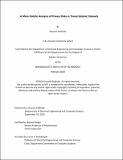A More Holistic Analysis of Privacy Risks in Transcriptomic Datasets
Author(s)
Sadhuka, Shuvom
DownloadThesis PDF (1.699Mb)
Advisor
Berger, Bonnie
Terms of use
Metadata
Show full item recordAbstract
Gene expression data provides molecular insights into the functional impact of genetic variation, for example through expression quantitative trait loci (eQTL). With an improving understanding of the association between genotypes and gene expression comes a greater concern that gene expression profiles could be matched to genotype profiles of the same individuals in another dataset, known as a linking attack. Prior work demonstrating such a risk could analyze only a fraction of eQTLs that are independent of each other due to restrictive model assumptions, leaving the full extent of this risk incompletely understood. To address this challenge, we introduce discriminative sequence model (DSM), a novel probabilistic framework for predicting a sequence of genotypes based on gene expression data. By modeling the joint distribution over all variants in a genomic region, DSM enables an accurate assessment of the power of linking attacks that leverage all known eQTLs with necessary calibration for linkage disequilibrium and redundant predictive signals. We demonstrate improved linking accuracy of DSM compared to two existing approaches on a range of real datasets including up to 22K individuals, suggesting that DSM helps uncover a substantial additional risk overlooked by previous studies. Our work provides a unified framework for assessing the privacy risks of sharing diverse omics datasets beyond transcriptomics.
Date issued
2024-02Department
Massachusetts Institute of Technology. Department of Electrical Engineering and Computer SciencePublisher
Massachusetts Institute of Technology